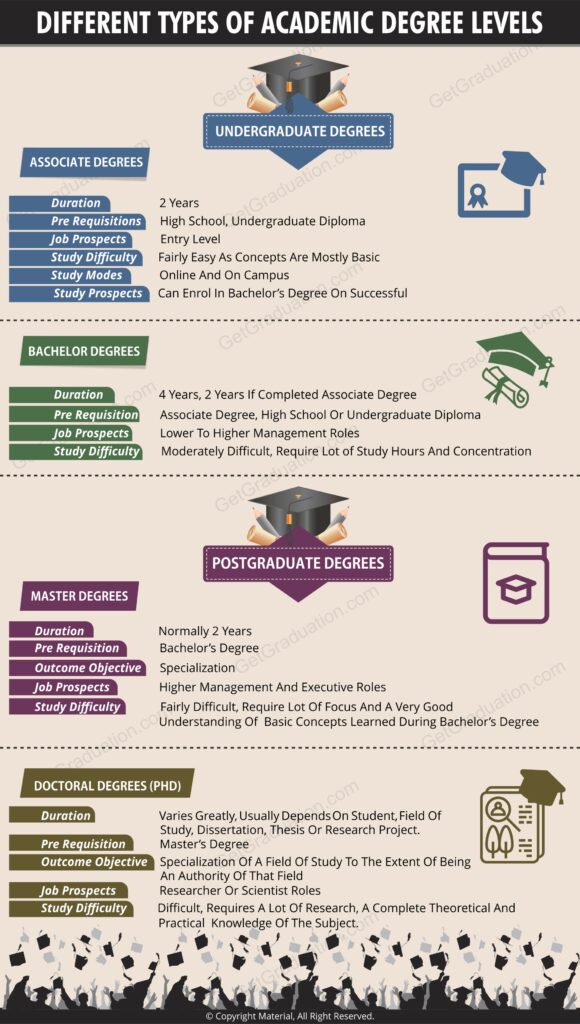Table of Contents
In Today’s fast-changing world when there is a great shift happening from labor-intensive jobs to skill-sensitive jobs, obtaining a higher education is critically important. There are various levels of degrees you can choose from, each with its benefits and requirements.
In this article, we are providing a comprehensive overview of different degree levels.
But first of all;
Why do you need to know the levels of degrees?
The reasons are many, a few of the most important are:
Education planning
A simple reason to know levels of degrees is “Education planning.” Suppose you graduated from high school and now want to plan for your degree. Understanding various levels of degrees will help you plan your academic path. You will be able to understand the level of education you want to pursue and the number of resources and time it will require. In that case, you need to know different degree levels, what comes next, and what to expect. It is also essential to know your options after you have completed your initial degree levels.
Clear objective
You should have a clear objective. What do you want to achieve? An associate degree will be enough for your career, or do you want to have a PhD.?
Clear Path To Your Objective
You should have a clear path to your objective. Which steps will enable you to get a PhD. or which course you need to select to maximize your options for career change?
Time It Will Take
You should have an exact set duration for each step. How long would you allow yourself to get your Ph.D.? Or by what time you need to be working at what job and which education will enable you to do that?
Job Opportunities
You will need to know if the path you are taking will have enough career opportunities down the line. Modern Technology may replace your trade, so you don’t want to spend four years learning a qualification.
Higher Education
Continuing to study further or wanting to build your academic career you will need a strong base. It is important to know the levels of degrees for your higher education. Ideally, you should enroll in a course with wider implications.
Career change
If you believe that your circumstances will change in the future, and you might need to switch careers, you must know different levels of degrees before you commit to a different path.
What are the different levels of degrees?
There are four different levels of degrees. These are Associate, Bachelor’s, Master’s and Doctoral degrees. These four levels of degrees are further categorized into two groups, undergraduate degrees, and postgraduate degrees.
Levels of degrees: Undergraduate degrees
First qualification from university or university-accredited college is considered undergraduate study. Therefor both Associate Degree and Bachelor’s Degree is considered undergraduate levels of degrees.
Associate degree
| Duration:2 years |
| Prerequisites: high school, undergraduate diploma |
| Job prospects: Entry level |
| Study difficulty: relatively simple as concepts are mostly basic |
| Study modes: Online and on campus |
| Future study prospects: can enroll in bachelor’s degree on successful completion. |
An associate degree is the most basic degree. It is an undergraduate degree level. An associate degree is an excellent choice if you are looking for an entry-level job. Or cannot commit yourself to a 4 year bachelor’s degree. The duration of an Associate degree is two years. An associate degree’s main objective is to prepare students for entry-level jobs. It is also a great starting point for higher education.
Main advantage of an associate degree is that it has a less workload than a bachelor’s degree. It is easy for people who already have commitments like kids or jobs.
Types of Associate Degrees
Associate degrees are classified into three types of associate degrees, and they are:
(A.A.) Associate of Arts.
(A.S.) Associate of Science
(A.A.s) Associate of Applied Science
What is The difference between Associate of Arts, Associate of Science, and Associate of Applied Science?
The main difference is in the focus of study and purpose of education. Associate of arts degree mainly focus on humanities and social science. such as English and history. Whereas the word “Applied ” is the main difference between Associate of Science and Associate of applied Science.
Evident by the name, Associate of Science is more academic in nature, focusing on general coursework and preparing students for further studies in a bachelor’s degree. The Associate of applied sciences on the other hand will focus on vocational and technical skills based on a career-specific approach with a more practical-oriented program. Further explanation can be found here
Read this guide to help you decide between ADN nursing or Associate Degree in Nursing
Career Opportunities for Associate Degrees
- Assistants
- Paralegals
- Computer support Specialists
Bachelor’s degree
| Duration: 4 years, 2 years if completed associate degree |
| Prerequisite: associate degree, high school or undergraduate diploma |
| Job prospects: Lower to higher management roles |
| Study difficulty: moderately difficult, requires more study hours and concentration. |
Bachelor’s degree is the most common type of degree that most people get before entering professional life. And like an Associate degree, a bachelor’s degree is an undergraduate degree. For most people, this is the end of formal education.
One of the significant differences between an associate degree and a bachelor’s degree is selecting one or more primary or major subjects. In contrast, an associate degree is a more general area of study. Majors or core subjects are the main focus of Bachelor’s degree.
For example, suppose you are planning to get a bachelor’s degree in accounting. In this case, your study’s primary focus will be accounting subjects like cost accounting, management accounting, and making and presenting actual financial reports. Even though you will also study the basics of budgeting, auditing, and various management methods, the main focus will remain on actual accounting.
A bachelor’s degree will serve as a prerequisite for further study if you want to pursue a postgraduate diploma or Master’s degree.
Types of Bachelor Degrees
Just like an associate degree, there are four main types of bachelor’s degree
Bachelor of Arts (B. A)
Bachelor of Fine Arts (BFA)
Bachelor of Science (B. S)
Bachelor of Applied Science (BAS)
What is the difference between a Bachelor of Arts and a bachelor of fine arts?
The Bachelor of Arts or B. A is the possibly most common bachelor’s degree and offers the most comprehensive subjects for selection. It gives more room to explore modern arts and provides more options to explore various fields of study. The most common among these subjects are literature, language, history, philosophy, music, communication, theater, drama, and culture. The complete list has a bigger range of different disciplines of study.
Whereas the main focus of a Bachelor of fine arts or BFA is more on the entertainment industry and creative arts. A bachelor of fine arts study aims to prepare you for professional arts, like acting, dancing, painting, singing, and sculptors. These are just a few to name as each of these disciplines has further majors within them. For example, if you are interested in painting, you could pursue further study in areas like oil painting, sketching, live painting, etc. The same goes for other disciplines.
What is the difference between a Bachelor of Science and a Bachelor of applied science?
Unlike a Bachelor of Arts or a Bachelor of fine arts, a Bachelor of Science is more specific, practical, and career-oriented. It requires a more in-depth understanding of one specific major subjects. Bachelor’s degrees in business, medicine, engineering, etc. are considered a bachelor of science.
On the other hand, a Bachelor of Applied Science is a more technical and career-specific degree than a Bachelor of Science. For example, a bachelor’s degree in business is considered a bachelor of science, whereas a bachelor’s in business administration (BBA) is a bachelor of applied science.
Career opportunities for Bachelors Degrees
- Engineers
- Accountants
- Marketing Managers
- Teachers
Read also: How long does it take to get a bachelor’s degree
Levels of degrees: Postgraduate degrees
So far, we have read about undergraduate levels of degrees, which can be broadly classified into associate degrees and bachelor degrees. Same way, postgraduate degrees can be classified into two broad categories.
Master’s degree
| Duration: Normally 2 years |
| Prerequisite: Bachelor’s degree| outcome objective: specialization |
| Job prospects: Higher management and executive roles |
| Study difficulty: fairly difficult, require a lot of focus and a very good understanding of basic concepts learned during bachelor’s degree. |
Once you have completed your bachelor’s degree in the desired major or field of study and want to advance your studies toward specialization in your chosen major, the next path is a master’s degree. A Master’s degree is based on your bachelor’s degree and usually builds on the concepts learned in a bachelor’s degree. Another critical aspect of a master’s degree is that it usually requires a project for graduation.
Usually, a master’s student pursues the same field as a bachelor’s degree. But it is not unheard of to change the major to a master’s degree. Changing the field of study at this level of education is not ideal but can be done in closely related fields.
For example, if you have studied, let’s say, agriculture for a bachelor’s degree and now want to study cryptography for a Master’s, it will be extremely hard for you as you don’t know any basics of cryptography. But if your major was Math for a bachelor’s degree, and now you want to study algorithms for a master’s degree, these fields are related, and it will be a little bit easier to learn.
Also, prerequisite subjects for a Master’s can stop you from changing areas of study.
Classification of Master’s degrees is broader than bachelor’s degrees. Some types of master’s degrees are:
- Master of Arts
- Master of Fine Arts
- Master of Science
- Master of Business Administration
- Master of Research
- Master by Research
Career Opportunities for Master’s Degrees
- Nurse Practitioners
- Data scientists
- Social Workers
- Public administrators
Doctoral Degree
| Duration: varies greatly, and usually depends on the student, field of study, dissertation, thesis, or research project. |
| Prerequisite: Master’s degree |
| Outcome objective: specialization of a field of study to the extent of being an authority in that field |
| Job prospects: Researcher or scientist roles |
| Study difficulty: difficult, requires a lot of research, a complete theoretical and practical knowledge of the subject. |
A doctoral degree is mostly based on research and advances the application of learned knowledge. It takes 3 to 6 years to complete. During a doctoral degree, the student should complete a significant research project.
Doctoral degrees are the highest level of awards in education. Mostly these are Ph.D. degrees. In some countries, the highest level of education is DSc.
What is the difference in between PhD and DSc?
The main difference between Ph.D. and DSc is a Ph.D. pathway is first a bachelor’s degree, A master’s degree, and a Ph.D. award by research or project.
In contrast, DSc is awarded after a complete portfolio of work. In other words, a portion of a Ph.D. is awarded throughout the academic career, but a DSc. is awarded later in the academic career.
Another difference is that a student can achieve a Ph.D. in almost any study field but a DSc. The doctorate of science is not awarded in literature. In some countries, both of these awards are equal; in others, A DSc. is a higher education level than a Ph.D.
A doctoral degree aims to equip the student with rigorous analytical and research skills to go and extend the boundaries of knowledge in their post-doctoral research.
A Ph.D. or doctor of philosophy is not the only doctoral degree. It may be the most commonly known doctoral degree, but a doctorate in some other professions is not always called a PhDs.
Some other doctoral degrees are:
- D.P.A doctor of public administration
- D.Ph. Doctor of public health.
- M.D. Doctor of medicine
- Ed. D Doctor of Education.
These are just some examples.
Career Opportunities for Doctoral Degrees
- Medical Doctors
- Lawyers
- Professors
- Scientists
Read professional degree vs academic degree To know about the difference between professional degrees and Academic degrees
Info graphic explaining all levels of Degrees in Order




















